NHS patients travel hundreds of miles for surgery
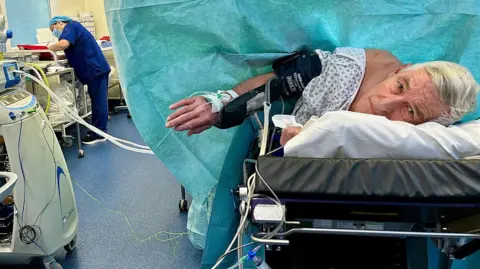 Nikki Fox/BBC
Nikki Fox/BBCAshley Self could barely walk because his hip hurt so much.
"It's made my life impossible for the last 12 months. In fact, I had to cease working because I couldn't get in and out of a car," he recalled.
Mr Self, from Norwich, was facing 18 months on a waiting list but everything changed when he was asked if he would travel 170 miles to get a hip replacement on the NHS.
"I'd go to North Africa or South Australia to have the operation because the pain is horrendous," was his response.
The BBC was with Mr Self at Burcot Hall Hospital in Bromsgrove, Worcestershire, during and after his procedure.
A local anaesthetic was injected into his spine so the 66-year-old former car dealer could still chat and joke with the theatre staff.
The hospital is run by a private company, Optimised Care, which has carried out hundreds of similar operations on behalf of the NHS in Norfolk.
Mr Self arrived by taxi and was put up in a hotel the night before the operation. He went home the day after he received his new hip.
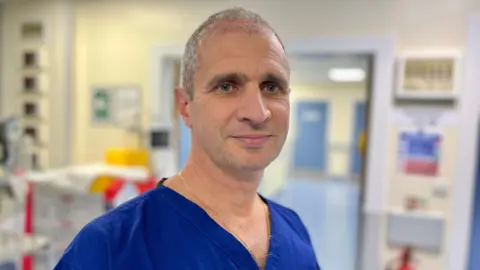 Kevin Saddington/BBC
Kevin Saddington/BBC"When we started, this was not a profit-making organisation," said Panos Makrides, a consultant orthopaedic surgeon and a director of Optimised Care.
"It all started as a way to demonstrate that we can do things a little bit better and provide some capacity. This is not an organisation that is here to make money."
In his view, the NHS is not very efficient.
"Visiting other centres elsewhere in the world, and speaking to other colleagues, there's been a feeling the NHS did not get a grasp of the latest evidence or accelerate pathways to get patients treated [more speedily] in more effective ways with better outcomes," Mr Makrides said.
The fundamental problem, according to the surgeon, is the number of patients going into emergency departments in hospitals and placing "so much pressure [on] the NHS and [on] bed capacity and theatre capacity".
The demands on A&E, he said, superseded planned surgery such as hip and knee replacements, with staff being diverted.
Because his hospital carried out only planned surgery, more patients could be treated more quickly, he added.
"Whereas in the NHS they'd do about three operations a day, we can do at least six," he said.
It comes as the government unveiled new plans to expand the use of the private sector to reduce waiting lists, with the NHS being asked to actively tell patients if they could be treated at a private hospital.
Labour wants to cut the list of patients waiting more than 18 weeks for NHS treatment in England by nearly half a million over the next year.
Its plans also include expanded community diagnostic centres and surgical hubs in the NHS.
Prime Minister Sir Keir Starmer said it would create millions more appointments and "deliver on our promise to end the backlog".
'High volume, low complexity'
Between April and November 2024, the NHS Norfolk and Waveney Integrated Care Board (ICB) spent £1.5m with Optimised Care. It meant 233 patients received treatment at Burcot Hall, instead of remaining on the waiting list for treatment at Norfolk and Norwich University Hospital.
Even with some patients being treated privately, Norfolk and Norwich University Hospital had the second lowest proportion of orthopaedics patients treated within the 18-week target in England during October.
The NHS Constitution states that patients who have been waiting more than 18 weeks have the right to request or be offered treatment elsewhere in the country.
Optimised Care charges the NHS standard tariff for hip replacements, which is about £6,900 a hip, said Mr Makrides.
As well as sending patients out of their areas for private care, the NHS is increasing the number of what it calls "elective surgical hubs", which follow a model similar to Burcot Hall.
Their remit is to deliver "high volume, low complexity" non-emergency surgery as a way of reducing waiting lists in England, which stood at a record 7.6 million in September with a slight reduction the following month.
More than 90 are now active, with a further 40 planned over the next three years.
They are supported by an NHS programme called Getting It Right First Time, which is trying to ringfence elective capacity to reduce waiting lists.
'It was just too much'
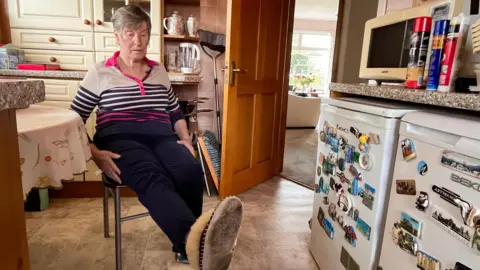 Martin Giles
Martin GilesFor Linda Oldfield, the 400-mile round trip to Burcot Hall from her home in Great Yarmouth, Norfolk, took its toll.
"The call came from the James Paget [hospital]. When he said 'We could get you into Bromsgrove', I said 'Yes, that's fine – where do I sign?'"
But after her hip operation and during the taxi journey back to Norfolk, she fell unwell.
"I hadn't recovered very well from the anaesthetic. I had been very, very sick," she said.
"I don't think I should have been discharged that day, to be honest. We faced a three-hour journey home by cab. It was just too much."
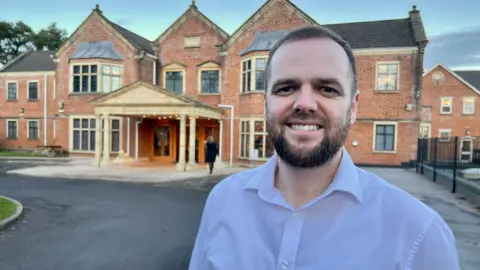 Kevin Saddington
Kevin SaddingtonThe company would use private ambulances for transport rather than taxis from now on, said Mark Whitehouse, Optimised Care's commercial director.
"We wouldn't operate on patients if we knew that sending them on a three-and-a-half-hour car journey or taxi journey would be a detriment to their clinical needs," he said.
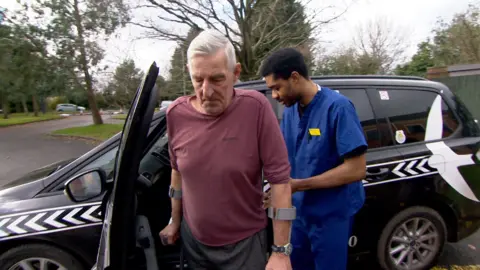 Nikki Fox/BBC
Nikki Fox/BBCWhen the BBC spoke to Mr Self after his operation, he said he was looking forward to going home and told of his delight at finally being able to get up and about.
"I'm sitting in a chair for the first time in ages. I can stand up straight. I'm an inch taller. The terrible pain has gone," he said.
A Department of Health and Social Care spokesperson said: “Where there is spare capacity in the private sector which can be used to treat patients, on NHS terms, free at the point of use, we will use it to cut waiting times."
Follow Norfolk news on BBC Sounds, Facebook, Instagram and X.
